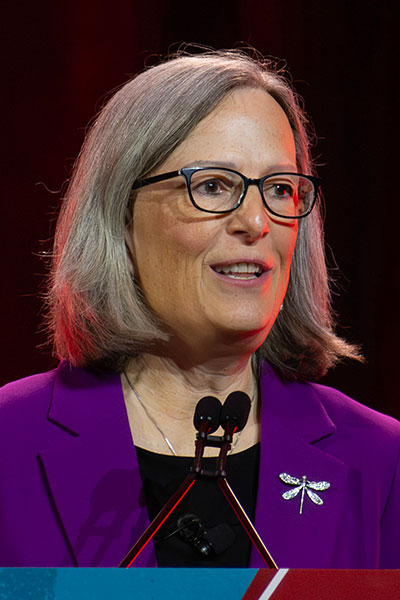People with diabetes instinctively seem to know food matters. “What can I eat?” is one of the most common questions to the American Diabetes Association® (ADA) national call center, said Alison Evert, MS, RDN, CDCES.

Clinicians are getting the same message, thanks in large part to the ADA Standards of Care in Diabetes—2025, which includes extensive nutrition information based on multiple studies and literature reviews Ms. Evert has coauthored over the years.
In accepting the 2025 Outstanding Educator in Diabetes Award on Saturday morning, June 21, at the 85th Scientific Sessions, Ms. Evert explained that while a growing body of research-based evidence and recommendations is helping guide patient and clinician decisions about nutrition, evidence is just the beginning.
“It is important to point out that it’s not evidence that people eat, it’s food,” she said. “As clinicians, we bring our clinical expertise and experience, as well as our knowledge of the evidence, to our patient encounters. And patients bring their own life experiences and knowledge of diabetes self-care. Where all this intersects is where the magic happens—shared decision making”
And this partnership needs to be nourished in a crowded world of self-proclaimed experts.
“As clinicians, we need to help our patients make decision about their food intake,” she said. “Hopefully those decisions are based on science and not on myth, or hype, or TikTok videos, or social media influencers.”
Diabetes professionals should bring nutrition therapy into every treatment plan, Ms. Evert emphasized. Food has huge impact on diabetes management.
The Standards of Care in Diabetes—2025 notes that A1C reductions from medical nutrition therapy (MNT) are greater or equal to medications in type 2 diabetes. In type 1 diabetes, MNT can reduce A1C up to 1.9%. And MNT is cost-effective.
MNT is also a covered benefit for most commercial and public health plans, she added, just like diabetes self-management education and support (DSMES). And like DSMES, MNT benefits are widely under-utilized
Ms. Evert outlined several key aspects of nutrition therapy supported by the ADA, from an emphasis on natural, non-starch foods to a wholistic dietary approach.
The ADA recommends individualized meal plans that consider nutrient quality, total calories, and metabolic goals. The data do not support a specific macronutrient pattern.
Eating patterns should emphasize key nutrition principles: emphasize non-starchy vegetables, whole fruits, legumes, lean proteins, whole grains, nuts, and seeds, and low-fat dairy or nondairy alternatives. Minimize consumption of red meat, sugar-sweetened beverages, sweets, refined grains, and processed or ultra-processed foods.
Nutrition therapy revolves around a person’s eating pattern, which is simply the combination of different foods or food groups that make up the totality of everything one eats and drinks. Typical healthy patterns include Mediterranean, low carbohydrate, plant-based/vegetarian/vegan, and Dietary Approaches to Stop Hypertension (DASH).
Ms. Evert noted that words matter when it comes to food. “Diet” is perceived by most people as an unsustainable, restrictive set of external rules that limit eating. It is far more helpful to talk about “eating plans” or “meal plans,” which are seen as positive, individualized daily guides.
“We need a long-term management approach for obesity care,” Ms. Evert said. “Like diabetes, it’s a chronic condition. Shouldn’t we implement strategies to support successful long-term use like we have in the diabetes world?”
On-demand access to recorded presentations, including the Outstanding Educator in Diabetes Award Lecture, will be available to registered participants following the conclusion of the 85th Scientific Session in Chicago, from June 25–August 25.

Watch the Scientific Sessions On-Demand after the Meeting
Extend your learning on the latest advances in diabetes research, prevention, and care after the 85th Scientific Sessions conclude. From June 25–August 25, registered participants will have on-demand access to presentations recorded in Chicago via the meeting website.

